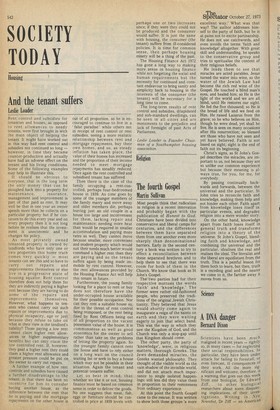Religion
The fourth Gospel
Mart in Sullivan
Most people think that radicalism in religion is a recent innovation and probably began with the publication of Honest to God. Christians have been divided into conservative and liberal camps for centuries, and the differences between them have separated 'them from one another even more sharply than denominational barriers. Early in the second century a book was written to try to effect a reconciliation between these separated brethren and to help them to see that there was room for both of them in the Church. We know that book as St John's Gospel.
The two parties had for their respective mottoes the words 'faith' and 'knowledge.' The former were rather old-fashioned people, who preserved the traditions of the original Jewish Christianity. They believed that Jesus would shortly come again to inaugurate a reign of the saints on earth and they were waiting eagerly to join that select band. This was the way in which they saw the Kingdom of God, and the Church was only a stop-gap until that Kingdom should come.
The other party, the party of 'knowledge', were, in religious matters, thorough Greeks, The Jews demanded miracles, the Greeks wanted philosophy. They thought of the visible world as the vain shadow of the invisible world, and did not attach much impor tance to single isolated happenings; still less did they value them in proportion to their remoteness from ordinary experience.
At this point the fourth Gospel came to the rescue. It was written to show both these groups 'a more excellent way.' What was that way? The author addresses himself to the party of faith, but he is at pains not to excite partisanship. He does not use catchwords, and even avoids the terms 'faith and knowledge' altogether. With great skill and understanding, he speaks to the conservative group and tries to spiritualise the content of their religious beliefs.
He leads them to see that miracles are acted parables. Jesus turned the water into wine, so the water of the Jewish Law had become the rich red wine of the Gospel. He touched a blind man's eyes, and healed him; so He is the light of the world and we are all blind, until He restores our sight. He fed the five thousand; so He is the bread of life and we feed on Him. He raised Lazarus from the grave; so he who believes on Him, though he were dead, yet shall he live. He is seen on many occasions after His resurrection; so blessed are those who have not seen and yet have believed. Faith is not based on sight; sight is the end of faith not its beginning.
Christ's signs, as St John's Gospel describes the miracles, are important to us, not because they are so unlike our common experience but because their meaning is always true, for you, for me, for everybody.
By passing continually backwards and forwards, between the universal and the particular, St John tries to reconcile faith and knowledge, making them help and not hinder each other. Faith apart from knowledge loses itself in particular events, and degrades religion into a mere wonder story.
On the other hand, knowledge apart from faith loses itself in general truth and transforms religion into a theory of the universe. St John's Gospel, blend ing faith and knowledge, and combining the universal and the particular, idealises the real and realises the ideal. The literalist and the liberal are equidistant from the truth. This is a painful lesson for them both to learn, but then, truth is a receding goal and the nearer we come to it, the farther away it moves from us.


































 Previous page
Previous page